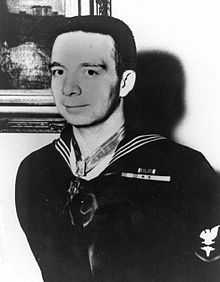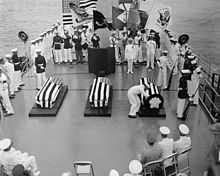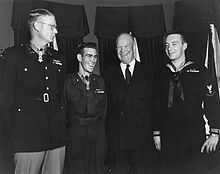William R. Charette
| William Richard Charette | |
|---|---|
|
 Medal of Honor recipient William Charette | |
| Born |
March 29, 1932 Ludington, Michigan |
| Died |
March 18, 2012 (aged 79)[1] Lakeland, Florida |
| Place of burial | Florida National Cemetery |
| Allegiance | United States |
| Service/branch | United States Navy |
| Years of service | 1951–1977 |
| Rank | Master Chief Hospital Corpsman |
| Unit | Fox Co., 2nd Battalion, 7th Marines |
| Battles/wars | Korean War |
| Awards |
Medal of Honor Purple Heart Medal |
William Richard Charette (March 29, 1932 – March 18, 2012) was a former United States Navy Hospital Corpsman and recipient of the U.S. military's highest decoration for valor, the Medal of Honor. The medal was awarded to him for his actions on March 27, 1953 during the Korean War.
Early life and career
Born on March 29, 1932, in Ludington, Michigan, Charette graduated from high school there in 1951. He enlisted in the U.S. Navy on January 11, 1951, and underwent recruit training at Naval Station Great Lakes, Illinois. He then attended the Hospital Corps School at Naval Training Center, Bainbridge, Maryland, becoming a Hospital Corpsman upon graduation. Duty at the Naval Hospital in Charleston, South Carolina, and an April 16, 1952, promotion to hospital corpsman third class followed.[2]
Charette volunteered to serve in Korea as a corpsman attached to the Marine Corps and reported to the Field Medical Service School, Camp Pendleton, California, for training on November 25, 1952. After graduating from the school he was assigned to Company F, 2nd Battalion, 7th Marine Regiment, 1st Marine Division, which embarked for Korea on February 5, 1953.[2]
Korean War service
- Medal of Honor
On March 27, 1953, during a Chinese attack on Marine outpost "Vegas", Charette faced a growing number of casualties exposed to hostile small-arms and mortar fire. When a grenade landed near him, he threw himself over his patient, absorbing the blast with his own body. In another instance, he removed his battle vest and placed it on a patient. In addition, he tore parts of his uniform to dress battle wounds and later stood up in a trench, exposing himself to incoming rounds, to aid a wounded comrade. He sustained many painful wounds during the battle.[2]
After the end of the war, Charette was still serving in Korea when he learned that he would receive the Medal of Honor. All five enlisted sailors who were awarded the Medal of Honor for actions during the Korean War were Navy hospital corpsmen who were attached to the Marine Corps. Charette was the only living recipient of the medal. He received the Medal of Honor in Washington, D.C., from President Dwight D. Eisenhower on January 12, 1954.[2]
Later years

Charlette continued his service with the Navy, training new hospital corpsmen at the Naval Hospital Corps School in Great Lakes, Illinois. In 1958, aboard USS Canberra, he had the honor of selecting the World War II remains (one from the Pacific, and one from the European that would be placed in the Tomb of the Unknowns in Arlington National Cemetery.
He eventually transferred to the Submarine Service, becoming one of the first hospital corpsmen to serve on a nuclear submarine. He served as an Independent Duty Corpsman (IDC) in the Navy’s nuclear submarine program. He served under Captain Edward L. Beach, Jr. on the USS Triton (SSN-586) (after the Triton had completed her historic submerged circumnavigation of the Earth) and was also an IDC on the USS Sam Houston (SSBN-609) Gold crew 1962-1965.
Charette's other assignments included the USS Quillback (SS-424); Fleet Ballistic Missile Training Center, Charleston, SC; USS Daniel Webster (SSBN-626); Naval Hospital, Orlando, FL; USS Simon Bolivar (SSBN-641); and at the Recruit Dispensary, Orlando, FL.
Retirement
He retired from the Navy at the rank of Master Chief Hospital Corpsman (HMCM (SS)) on April 1, 1977 after 26 years of service.[3] [2]
On April 30, 1999, the Charette Health Care Center in Portsmouth, Virginia was dedicated in his honor.
Charette was a member of the Congressional Medal of Honor Society, the Korean War Veterans Association, William R. Charette Chapter 158, Elks Lodge 1974, Veterans of Foreign Wars Post 2420 in Lake Wales, Florida, Sea Poacher Base United States Submarine Veterans Inc. (USSVI), Fleet Reserve Association in Charleston, South Carolina, Florida Chief Petty Officer Association and many other veteran and charitable organizations.
Master Chief Charette died on March 18, 2012 due to complications from heart surgery, shortly before his 80th birthday. He was interred at the Florida National Cemetery in Bushnell, Florida.
Awards and decorations
Charette's military awards include:[2]
 Enlisted Submarine Warfare Insignia Enlisted Submarine Warfare Insignia |
| Medal of Honor | |
| Purple Heart | |
| Combat Action Ribbon | |
| Navy Unit Commendation (awarded to the 1st Marine Division for service in Korea) | |
|
Navy Good Conduct Medal with silver service star (6 awards) |
|
National Defense Service Medal with bronze service star (2 awards) |
|
Korean Service Medal with two bronze service stars |
| Korean Presidential Unit Citation | |
| United Nations Korea Medal | |
| Korean War Service Medal |
Medal of Honor

Charrette was one of eight field medics and corpsmen to be awarded the Medal of Honor in Korea. However, he was one of only two (the other being US Army Staff Sergeant David B. Bleak) for whom the decoration was not posthumous. Those recognized after their deaths were Richard G. Wilson and Bryant E. Womack from the Army, and Edward C. Benfold, Richard Dewert, Francis C. Hammond, and John E. Kilmer from the US Navy.
Charette's official Medal of Honor citation reads:
For conspicuous gallantry and intrepidity at the risk of his life above and beyond the call of duty in action against enemy aggressor forces during the early morning hours. Participating in a fierce encounter with a cleverly concealed and well-entrenched enemy force occupying positions on a vital and bitterly contested outpost far in advance of the main line of resistance, HC3c. CHARETTE repeatedly and unhesitatingly moved about through a murderous barrage of hostile small-arms and mortar fire to render assistance to his wounded comrades. When an enemy grenade landed within a few feet of a marine he was attending, he immediately threw himself upon the stricken man and absorbed the entire concussion of the deadly missile with his body. Although sustaining painful facial wounds, and undergoing shock from the intensity of the blast which ripped the helmet and medical aid kit from his person, HC3c. CHARETTE resourcefully improvised emergency bandages by tearing off part of his clothing, and gallantly continued to administer medical aid to the wounded in his own unit and to those in adjacent platoon areas as well. Observing a seriously wounded comrade whose armored vest had been torn from his body by the blast from an exploding shell, he selflessly removed his own battle vest and placed it upon the helpless man although fully aware of the added jeopardy to himself. Moving to the side of another casualty who was suffering excruciating pain from a serious leg wound, HC3c. CHARETTE stood upright in the trench line and exposed himself to a deadly hail of enemy fire in order to lend more effective aid to the victim and to alleviate his anguish while being removed to a position of safety. By his indomitable courage and inspiring efforts in behalf of his wounded comrades, HC3c. CHARETTE was directly responsible for saving many lives. His great personal valor reflects the highest credit upon himself and enhances the finest traditions of the U.S. Naval Service.[4]
Legacy
On 30 April 1999, the Charette Health Care Center, a part of the Naval Medical Center Portsmouth, Virginia, was dedicated in his honor.[3]
AMVETS Post 82 of Ludington, Michigan, named itself after hometown hero William R. Charette in 1982. In downtown Ludington, there is a mural dedicated to William R. Charette. It depicts his tour of duty during which he earned the Medal of Honor.
William R. Charette was able to come to Ludington and see the mural before his death.
Recently, a sign was put up near the Memorial Medical Center that honors William R. Charette.
A Sea Cadet unit is named in his honor, National Naval Medical Center Bethesda William R. Charette Battalion.
See also
| Wikimedia Commons has media related to William R. Charette. |
References
- ↑ "Medal of Honor recipient dies at 79 - Navy News | News from Afghanistan & Iraq". Navy Times. Retrieved 2012-03-20.
- ↑ 2.0 2.1 2.2 2.3 2.4 2.5 "Master Chief Hospital Corpsman William Richard Charette, USN (retired)". Who's Who in Marine Corps History. United States Marine Corps History Division. Retrieved June 9, 2011.
- ↑ 3.0 3.1 "HMCM (SS) WILLIAM R. ("DOC") CHARETTE, USN (Ret)". Naval Submarine League. 23 April 2012. Retrieved 29 April 2012.
- ↑ "Medal of Honor Recipients - Korean War". Medal of Honor Citations. United States Army Center of Military History. December 3, 2010. Retrieved June 9, 2011.
